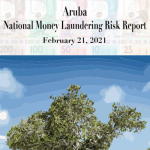National Cooperation
National Cooperation
Cooperation on a national level with various entities is of crucial importance in order to successfully prevent and combat money laundering, terrorist financing, proliferation financing and associated predicate offences.
The Recommendations and the Methodology of the Financial Action Task Force (FATF) require that countries identify and assess the money laundering and terrorist financing risks for the country. Based on the results of the risk assessment, countries should apply a risk based approach to mitigate the identified risks. Aruba conducted a national risk assessment (NRA) and the results were published on 21 February 2021 in a summary report of its money laundering national risk assessment.
The need for national cooperation has also been set forth as a requirement in the FATF Recommendation 2 stating that countries should have national anti-money laundering (AML), combating terrorism financing (CFT) and countering proliferation financing (CPF) policies in place that are based on identified risks. These policies must be reviewed regularly and translated into effective cooperation mechanisms on a policy and operational level.
FIU-Aruba cooperates in a multitude of ways with the different actors within the AML/CFT/CPF-chain in Aruba. The FIUs’ participation in the AML/CFT Steering Group and the Financial Investigation Partners meeting (FOP) are examples of cooperation on a national level.
The FIU functions as a ‘buffer’ between the service providers (incoming information) and the competent authorities that are a recipient of the financial intelligence (outgoing intelligence). Therefore, the FIU must seek broad cooperation on a national level with the service providers and all relevant and competent authorities.
Service providers
In order to gather valuable information from the unusual transaction reports that are submitted by the service providers, FIU-Aruba must inform the different sectors on topics, such as, their reporting obligation and relevant red flags to take in consideration when determining the unusual character of a transaction. An important focus of the FIU is to increase the quality of (subjective) reporting.
FIU-Aruba organizes periodic Compliance Officer Meetings (co-meetings) with several large and/or high risk sectors. In these meetings, the FIU and the compliance officers tackle different topics depending on national and international developments, identified risks and typologies and case examples.
Information sessions are another way of providing service providers with information on various topics. The FIU also regularly participates and provides general as well as sector-specific presentations.
Law enforcement authorities and the Public Prosecutor’s Office
FIU-Aruba disseminates financial intelligence reports (FIRs) to competent authorities in accordance with article 24 of the AML/CFT State Ordinance. The main recipients of FIRs are the law enforcement authorities and the Public Prosecutor’s Office. Examples of law enforcement authorities are:
- Aruban Police Force (KPA)
- Tax information and investigation Department (FIOT)
- Customs
- Royal Netherlands Military Police (KMAR)
The FIU maintains extensive contact with law enforcement authorities and the Public Prosecutor’s Office to ensure that the intelligence provided in FIRs is utilized effectively as guidance information and to the greatest extent possible in criminal investigations. Knowledge and awareness of the value of financial intelligence are key to the effective use of FIRs. An example is the FIUs participation in the Asset Recovery Team (Afpakteam).
Security and intelligence authorities
FIU-Aruba also cooperates with security and intelligence authorities. Examples of these authorities are:
- Security Service of Aruba (VDA)
- National Central Bureau Counterterrorism, Safety and INTERPOL (NCTVI)
The NCTVI and FIU-Aruba maintain close contact on a operational, strategic and informative level. An awareness campaign was initiated about the dangers associated with various fraudulent practices, including online scams. This campaign is aimed at informing the public and service providers on how to identify a possible scam.
Supervisory Authority
The Central Bank of Aruba (CBA) is currently the sole AML/CFT Supervisory Authority in Aruba. Supervision is conducted over designated financial and non-financial service providers.
The FIU maintains intensive contact with the CBA. The FIU exchanges information with the CBA regarding the reporting behavior of service providers. Emerging risks and trends are also addressed, and the FIU and the CBA regularly jointly participate in information sessions for specific sectors.
More information on AML/CFT supervision is available on the website of the CBA.
Other competent authorities
Cooperation is also sought with other competent authorities to prevent and combat AML/CFT/CPF within Aruba. This cooperation can vary depending on the kind of cooperation that is required, such as through presentations, joint participation in cooperation mechanisms on a policy level, or the dissemination of FIRs. In keeping with the AML/CFT State Ordinance, FIU-Aruba has the authority to disseminate FIRs to other competent authorities. Examples of competent authorities:
- Ministry of Finance
- Ministry of Justice
- Ministry of Foreign Affairs
- Chamber of Commerce
- Department of Economic Affairs, Commerce & Industry of Aruba (DEACI)
- Department for Infrastructure Management and Planning (DIP)
- Department for the Integration, Management and Admission of Foreign Nationals (DIMAS)

